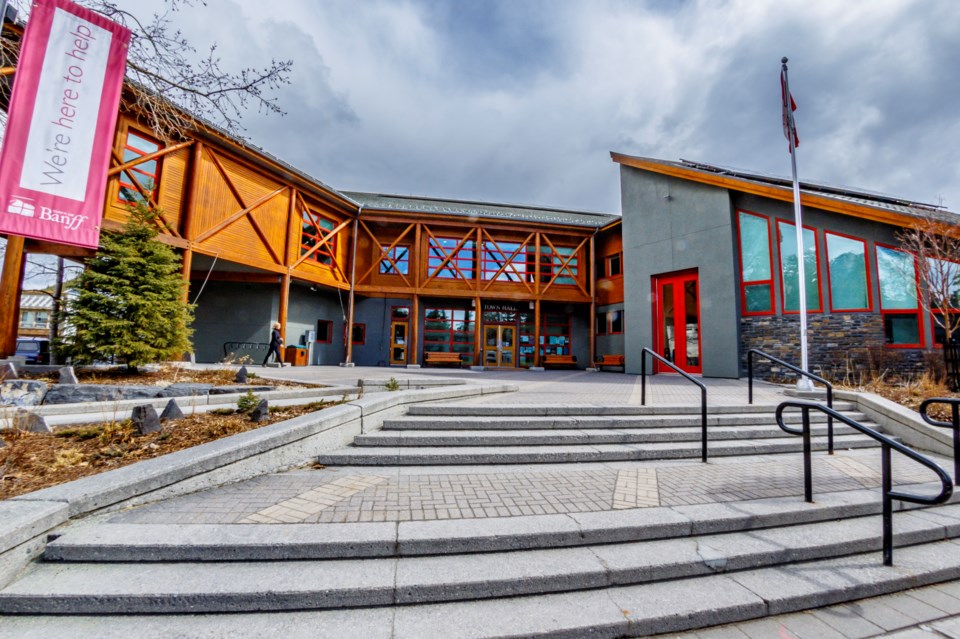BANFF – Banff residents can expect to see a significant overall tax increase for 2020, primarily due to the provincial government’s education tax grab.
On Monday (Dec. 2), council’s review of the 2020-22 operating budget and 10-year capital plan got underway, with the starting point sitting at a 5.16 per cent overall tax increase for 2020 – 2.9 per cent of which is the school tax requisition the Town of Banff collects for the province.
Town of Banff officials say one of the biggest challenges facing councillors in this budget is whether or not they allow the provincial budget changes, including cuts to capital funding and social programming, to affect their own decisions on municipal services and projects.
“Philosophically, does council want to reduce from our local municipal services in order to make whatever the tax increase may be more palatable because of this excessive collection from the province?” said Mayor Karen Sorensen.
“It’s interesting, when you take out the 2.95 per cent … it appears to me we have the same level of service plus the additional services that we’ve added in previous years at less than the rate of inflation. That’s good, but I understand at the end of the day this still says 5.16 per cent.”
The education tax amount the Town levied for 2019 was based on an education tax estimate of $8,294,780, but the final requisition from the province was $8,420,661, leaving a shortfall of $125,881.
For 2020, the estimate is a nine per cent hike, leading to the projected 2.95 per cent increase in school tax requisition for 2020.
“It should be noted that about half a per cent of that is to cover off the $125,000 under levy in 2019,” said Chris Hughes, the Town of Banff's finance manager.
The Town is forecasting a surplus of almost $1 million for 2019 due to a strong tourism economy and redevelopment within the townsite, but administration hasn’t recommended allocating that to either of the capital or operating budgets at this stage.
“Council can decide later, or they can decide during this budget and service review process, what to do with those surplus funds,” said Kelly Gibson, the Town’s corporate services director.
The 5.16 overall increase, which includes the municipal levy, provincial school tax and Bow Valley Regional Housing, is the starting point for budget discussions. Every additional $292,599 spent equals a one per cent overall tax increase.
In the coming weeks, council will be considering about 25 new requests for projects and services with operating budget impacts of $475,000 in 2020 and capital budget expenditures of $3.8 million.
Some of the new requests include a 40-hour work-week for bylaw, free drop-in recreation for all Banff residents, a scramble intersection at Elk Street and Banff Avenue, FireSmart projects, Route 3 Roam increase and enhanced Calgary-Banff summer bus service.
In addition, new positions are also being pitched: a municipal energy manager as a two-year contract position at $40,000 per year, and a $52,000 half-time emergency coordinator beginning in 2021.
The Town funding for a municipal energy manager is 20 per cent of the base salary plus benefits for this position, with another $75,000 coming from a grant program under the Municipal Climate Change Action Centre.
Already included in the budget is a 1.1 per cent cost-of-living wage increase for Town employees, as well as $270,655 worth of projects and services council had previously approved, such as increased local Roam frequency and a downtown recycling depot.
Mayor Sorensen said most of the new service level requests are driven by council’s strategic plan and direction to administration from council throughout the year.
“Now we’ve got the numbers and now we make a decision whether it’s something we actually want to move forward with,” she said.
Councillor Peter Poole said he would like administration to help council identify areas where there could be possible cuts or interruption of services, noting that could help council make better decisions.
“By that, I’m not saying that some things we may currently cherish need to be tossed out automatically, rather that you can help us juggle some different priorities,” he said.
“If you could help us by say, ‘this one costs $100,000 and this one costs $100,000, do you have a preference this year between this one and that one?' ” he added.
“Maybe there’s a new issue that we’ve come to learn and it deserves the attention and one that’s currently from a couple of years ago that may be possible to be interrupted for a year.”
The capital budget has $16.1 million worth of new projects for 2020 and $16.1 million for 2021 before dropping off for the remainder of the 10-year capital plan. Banff’s average annual capital expenditures are $10 million.
In additon, there are capital projects worth $22 million being carried over from this year for a host of reasons.
“That’s a significant number which comes form small number of projects,” said Hughes, pointing to the transit storage facility and Sulphur Mountain sewer line replacement.




